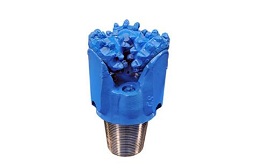Tricone drill bits are the go-to solution for almost any well digging, from everything to simple water wells to industrial scale oil extraction. Tricone bits come in several different varieties, and can deal with a wide range of different rock formations. Most tricone bits are either Mill Tooth bits, or TCI bits, and there is an ideal tricone bit for soft, medium, or hard rock formations. It is important to know the type of formation you are drilling in when selecting a drill bit.
1. Tricone drill bits for soft rock formations
Soft rock formations consist mainly of sand, clay, limestone or shale and are ideal for drilling with Mill Tooth Tricone bits. When working with soft formations you can use either sealed bearing or open bearing mill tooth tricone bits, depending on the scope and duration of your project. Sealed bearing tricone bits are longer lasting, but generally more expensive due to the precision work required to protect the bearings. Open bearing bits, on the other hand, are not as well protected and will wear out more quickly, however they are cheaper to manufacture. Tricone bits designed for soft rock generally have longer protruding teeth, “A” shaped teeth, or chisel shaped buttons. In all cases the teeth will be more widely spaced for tricone bits that are designed with soft formations in mind.
2. Tricone bits for medium rock formations
If you’re drilling in calcites, dolomites, hard limestones, and some hard shale you’ll need a tricone bit designed for medium rock formations. You may want a TCI Tricone bit. To better understand why tungsten carbide is ideal it’s useful to know about its properties. First discovered in 1927, Tungsten carbide is an exceptionally strong and hard material, this allows it to withstand higher speeds for more rapid drilling. Additionally tricone TCI bits are much more capable at absorbing the significant amounts of heat generated without damaging the tricone drill bit. Medium formation bits have teeth that are far closer together than what you see with soft formation drill bits. Additionally the teeth are less protruding, although they may still come in a similar range of shapes.
3. Tricone bits for hard rock formations
Hard rock formations are hard and abrasive formations usually made up of hard shale, calcites, mudstones, chert, pyrite, granite, quartzite, and cherty lime stones. The difficulties of drilling in this material make a TCI tricone bit all but mandatory. The exceptional hardness and strength of TCI “buttons” for the drill bits allow them to endure very difficult drilling conditions. As with all tricone bits there is an option between sealed bearing and open bearing. Sealed bearing bits are considerably more protected from wear and tear and therefore suitable for much more use before being replaced. Gauge protection can also significantly increase the lifespan of a tricone drill bit. Bits designed for hard formations continue the trend of less protruding teeth placed closer together. The teeth will be very short and placed very closely together. This results in a much slower drilling speed than you would get with medium or soft formation drill bits, however if you are drilling through hard rock strata you don’t have much choice.
As a tricone bits factory, we can produce tricone bits which are ideal for soft, medium, and hard formations. Hopefully the above information has given you an idea of which tricone bit is ideal for the various rock formations you may have to contend with.

Copyright © Guiyang Top Equipment All Rights Reserved
Sitemap | Powered by 